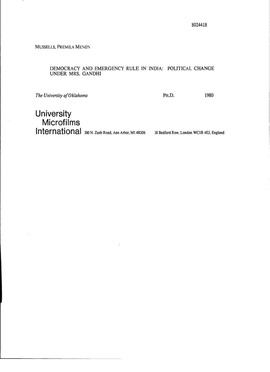| dc.contributor.author | Mussells, Premila Menon, | en_US |
| dc.date.accessioned | 2013-08-16T12:28:06Z | |
| dc.date.available | 2013-08-16T12:28:06Z | |
| dc.date.issued | 1980 | en_US |
| dc.identifier.uri | https://hdl.handle.net/11244/4750 | |
| dc.description.abstract | An analysis of the actions of the Emergency reveals a systematic perversion of the fundamental concepts of constitutionalism and a corresponding attempt at the institutionalization of an authoritarian political system in place of the democratic system that India had adopted at independence. The changes to the political and constitutional system made during this period are remarkable for their disregard for constitutional constraints and their deviation from accepted democratic norms. There was suspension of civil liberties, denial of due process of justice and the revocation of the rule of law. All meaningful opposition was disallowed, public dissent stifled and the freedom of the press virtually destroyed. Permanent changes to the political order were enacted through constitutional amendments which altered the distribution of power among the branches of government, reduced the scope of citizens' rights, curtailed judicial review and gave parliament absolute authority to amend the Constitution. In short, the 1975 Indian Emergency was characterized not merely by the institution of a temporary crisis government with expanded powers to meet an extraordinary situation, but by the emergence of a government which sought to institutionalize authoritarian norms and procedures in Indian politics. | en_US |
| dc.description.abstract | The study, however, is not confined to an examination of the changes made to the Indian political system during the Emergency. While these changes, no doubt, sanctioned a fundamental shift away from democratic institutions and processes, they are essentially the logical outcome of the authoritarian trend in Indian politics, which had developed under Mrs. Gandhi. The significance of the Emergency cannot be fully recognized unless the Emergency is viewed against the backdrop of the process of political change that preceded it. Therefore, this study is also concerned, as its subtitle suggests, with the larger issue of political change under Mrs. Gandhi. | en_US |
| dc.description.abstract | This is a study of political change--the Indian Emergency of June 1975 to March 1977. It examines the events that led up to it and the political and constitutional changes instituted under it, with a view to understanding the dilemma posed by the subversion of democratic political systems through ostensibly constitutional means. | en_US |
| dc.format.extent | 247 leaves ; | en_US |
| dc.subject | Political Science, General. | en_US |
| dc.title | Democracy and Emergency rule in India : | en_US |
| dc.type | Thesis | en_US |
| dc.thesis.degree | Ph.D. | en_US |
| dc.thesis.degreeDiscipline | Department of Political Science | en_US |
| dc.note | Source: Dissertation Abstracts International, Volume: 41-05, Section: A, page: 2276. | en_US |
| ou.identifier | (UMI)AAI8024418 | en_US |
| ou.group | College of Arts and Sciences::Department of Political Science | |
